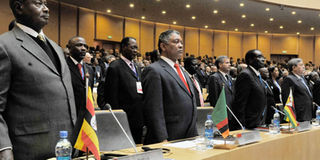Changes loom in AU as Africa awaits two major elections

Reforms. President Museveni (left) attends an African Union General Assembly at the AU headquarters in Addis Ababa, Ethiopia. FILE PHOTO
What you need to know:
- Regarding the long-awaited presidential election in DR Congo, it is set for December 23 and is crucial for the nation, which has not had a peaceful transition of power since independence from Belgium in 1960.
- The younger Tshisekedi and the other candidates in the race will be facing Kabila’s hand-picked successor, the reportedly shadowy former interior minister Emmanuel Ramazani Shadary.
As the last month of the year begins, a raft of African Union reforms is on course even as two major elections loom on the continent, in Madagascar and DR Congo.
The looming reforms at the global body were clearly articulated during the 11th extraordinary session of the AU Summit that ended two weeks ago.
The reforms are the handiwork of a team led by outgoing AU chairman, Rwanda’s president Paul Kagame, who for the past two years has served as the chairperson of the AU reforms committee.
While focusing on institutional reform of the continental body, Kagame’s team came up with several innovations, some of them aimed at strengthening peace and security responses on the continent.
The changes looming at the AU are a fitting legacy for the outgoing AU chairman, who is expected to hand over to Egypt’s president Egypt’s Abdel Fattah el-Sisi in January 2019.
Among major developments during the recent summit of the AU Assembly was the approval of the mandate of the newly-constituted AU Development Agency (AUDA).
The proposed changes at the AU will come amid rising anxiety regarding landmark presidential elections to be held later this month in Madagascar and DR Congo.
The polls in the two countries will mark the climax of a particularly dramatic season in the African electoral calendar, with results that are difficult to predict, given the complex political situations in the two countries.
The first presidential poll to be held this month will be the Madagascar one slated for December 19, and which will be a re-run of the hotly contested one held on November 7.
The run-off comes after neither candidate won the 50 per cent of votes required for a first-round victory, and is viewed as crucial in a nation that has a long history of political instability and coups, and which ranks among the world’s poorest countries.
The re-run will pit Mr Andry Rajoelina and Mr Marc Ravalomanana, two former presidents of Madagascar, against each other, and will be the first time the bitter rivals will have faced each other at the ballot box.
Mr Rajoelina was in power until 2014, having earlier ousted Mr Ravalomanana, who ruled Madagascar from 2002 to 2009 until he was ousted in a military-backed coup that installed the former.
Ironically, though, as a result of international pressure aimed at pre-empting a repeat of the deadly political violence that shook the island in 2009, both Mr Rajoelina, 44, and Mr Ravalomanana, 68, were banned from running in the last election in 2013.
Regarding the long-awaited presidential election in DR Congo, it is set for December 23 and is crucial for the nation, which has not had a peaceful transition of power since independence from Belgium in 1960.
The poll will be a major test for the county’s opposition, which will be seeking to oust the tenacious incumbent, Joseph Kabila, 47, who has ruled since his father, Laurent-Desiré Kabila, was assassinated in 2001.
In all, 21 candidates are registered to run in the race to replace Kabila, whose second and final elected term in office ended nearly two years ago, but who has remained in office thanks to a caretaker clause in the Constitution.
Among the leading candidates will be Felix Tshisekedi, the 55-year-old son of the late Etienne Tshisekedi, who before his death was for decades the face of the DRC’s opposition.
The younger Tshisekedi and the other candidates in the race will be facing Kabila’s hand-picked successor, the reportedly shadowy former interior minister Emmanuel Ramazani Shadary.




